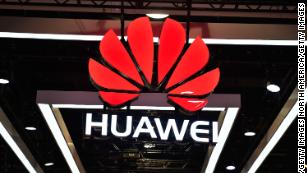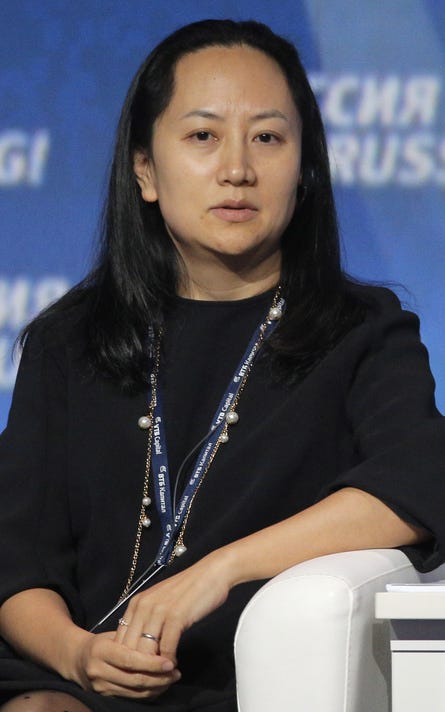By Julia Horowitz
Meng Wanzhou, CFO of Huawei
New York -- The chief financial officer of Chinese tech giant Huawei has been arrested in Canada.
She faces extradition to the United States.
Meng Wanzhou, also known as Sabrina Meng and Cathy Meng, was apprehended in Vancouver on December 1, according to Canadian Justice Department spokesman Ian McLeod.
In addition to her role as CFO, Meng serves as deputy chairwoman of Huawei's board.
She's the daughter of Huawei founder Ren Zhengfei.
Meng "is sought for extradition by the United States, and a bail hearing has been set for Friday," McLeod said in a statement, which was first reported by The Globe and Mail.
McLeod said the Canadian Justice Department can't share details of the case.
Meng "is sought for extradition by the United States, and a bail hearing has been set for Friday," McLeod said in a statement, which was first reported by The Globe and Mail.
McLeod said the Canadian Justice Department can't share details of the case.
Meng was granted a publication ban after a judge agreed to bar both police and prosecutors from releasing information about the case.
A Huawei spokesperson said Meng was detained by Canadian authorities on behalf of the United States when she was transferring flights in Canada.
A Huawei spokesperson said Meng was detained by Canadian authorities on behalf of the United States when she was transferring flights in Canada.
Huawei said she faces unspecified charges in the Eastern District of New York.
The Wall Street Journal reported in April that the US Justice Department was investigating whether Huawei violated US sanctions on Iran.
The US Justice Department declined to comment Wednesday.
China's Ministry of Foreign Affairs on Thursday called for Meng to be released and urged the United States and Canada to explain why she had been detained.
The Chinese company, which sells smartphones and telecommunications equipment around the world, has been facing increased scrutiny in the United States and other countries, where officials have warned of national security risks from using Huawei products.
China's Ministry of Foreign Affairs on Thursday called for Meng to be released and urged the United States and Canada to explain why she had been detained.
The Chinese company, which sells smartphones and telecommunications equipment around the world, has been facing increased scrutiny in the United States and other countries, where officials have warned of national security risks from using Huawei products.
The United States is concerned that the Chinese government is using Huawei's networking technology to spy on Americans.
 Huawei's 5G ambitions suffer another big setback
Huawei's 5G ambitions suffer another big setback
 Huawei's 5G ambitions suffer another big setback
Huawei's 5G ambitions suffer another big setbackSenator Ben Sasse, a Republican from Nebraska, said Americans are grateful to Canadian authorities for arresting Meng.
"Chinese aggression is explicitly state-sponsored and sometimes it's laundered through many of Beijing's so-called 'private' sector entities that are in bed with Xi's communist party," he said.
Senator Chris Van Hollen — a Democrat from Maryland — said Chinese telecommunications companies represent a fundamental risk to American national security.
"We need a comprehensive plan to hold the Chinese and their state-sponsored entities accountable for gross violations of the law and threats to our security," he said.
The Pentagon in May ordered stores on American military bases to stop selling smartphones made by Huawei and Chinese rival ZTE.
And in February, top officials from the CIA, NSA, FBI and the Defense Intelligence Agency told a Senate committee that those firms' smartphones posed a security threat to American customers.
 New Zealand prevents mobile carrier from buying Huawei 5G tech over security fears
New Zealand prevents mobile carrier from buying Huawei 5G tech over security fears
 New Zealand prevents mobile carrier from buying Huawei 5G tech over security fears
New Zealand prevents mobile carrier from buying Huawei 5G tech over security fearsThe Trump administration launched an extraordinary campaign, urging America's allies to stop using Huawei telecommunications equipment because the Chinese company poses a security threat, according to the Wall Street Journal.
Over the past several weeks, New Zealand and Australia have prevented telecommunications companies from using Huawei equipment for their 5G mobile networks.
UK telecom company BT (BT) said Wednesday that it would not buy equipment from the Chinese tech company for the core of its next generation wireless network.
UK telecom company BT (BT) said Wednesday that it would not buy equipment from the Chinese tech company for the core of its next generation wireless network.
The company also said it would remove existing Huawei technology from the heart of its 4G network within two years.
China's ZTE also faced accusations of illegal dealings with Iran.
China's ZTE also faced accusations of illegal dealings with Iran.
In April, the United States blocked ZTE from buying US parts because ZTE had lied to US officials about punishing employees who violated US sanctions against North Korea and Iran.
But the Trump administration lifted the export ban on ZTE in July after striking a deal with the company.

/arc-anglerfish-tgam-prod-tgam.s3.amazonaws.com/public/2WAU7YYMDVHRLLR47IA3L4LDX4.JPG)

 Manivannan Gajendran and Eric Hsu are former Istuary employees. “Chinese clients had lots of ideas for ways they would use our applications. Some of those raised red flags,” Mr. Hsu said.
Manivannan Gajendran and Eric Hsu are former Istuary employees. “Chinese clients had lots of ideas for ways they would use our applications. Some of those raised red flags,” Mr. Hsu said.
